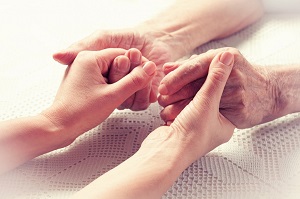Half of all married couples will experience the death of a spouse in their lifetime, and there is nothing more stressful, no matter what the circumstances. And when it’s your mom or dad dealing with this loss, you have to somehow manage your own grief while supporting them in their struggle.
This is particularly true if you’re living near enough to your surviving parent to be an active part of their support network. In this case, it’s especially important for you to get the rest, nourishment, practical help, and emotional support you need to be able to assist them.
Here are some key aspects about elderly grieving to keep in mind:
– SIGNS of grieving: Other than the obvious (crying, sadness) your mom or dad may also experience trouble sleeping; little interest in eating or dressing; problems concentrating or making simple decisions; irrational feelings of anger; or a delayed grief reaction all together. Guilt may also factor in: if your mom passed away in a nursing home, your dad may regret that he’d placed her there at all, or that he couldn’t be with her when she died. Or if the death occurred after a lengthy debilitating illness, there may even be feelings of relief mixed in (which can also cause guilt).
It’s important to try and meet these feelings with patience and understanding. Don’t avoid stopping in or calling regularly; these circumstances, however difficult, are usually temporary and are a very necessary part of the healing process.
– STAGES of grief: Dr. Elizabeth Kubler-Ross’ breakthrough publication On Death and Dying outlined what came to be known as the five universal stages of grief – denial, anger, bargaining, depression, and finally acceptance. But new studies have challenged this scenario, arguing that people’s grief processes are uniquely individual, and are far more likely to follow ups and downs, with feelings that ebb and flow from one day to the next. Your mom could be angry one day (“how am I supposed to know how to jumpstart the car’s dead battery – Dad always handled this!”) and outwardly chipper the next, preferring to go through the motions at your favorite shopping spot rather than touching on deeper feelings.
While conventional wisdom tends to place a broad 2-3 year timetable on a healthy grieving period for surviving spouses, remember that during that timeframe, there are no rules and no one way to be.
– DIFFERENCES in women and men: When it comes to losing a spouse, wives fare better overall than their husbands, perhaps because women are more likely to have an active friendship network. But both have their issues coping, often depending on how they had divided household responsibilities. Your dad may struggle with cooking healthy meals for himself, or with taking over the bills if your mom managed household finances. If your mom is widowed, she may worry about feeling safe living alone, or about having to file income taxes. It’s important not to make assumptions about their capabilities but to ask specifically how they’re handling household tasks, and how you can get them the help they need.
– WHEN to Seek Help: There’s reason for concern if your mom or dad is debilitated by anxiety or depression, abusing drugs or alcohol, or showing signs of malnourishment or declining personal hygiene. Consult a doctor to assess if medication is necessary, and also to help connect your parent to support groups or grief counseling.
NEXT WEEK: Moving On – how to help your parent take meaningful steps towards healing

